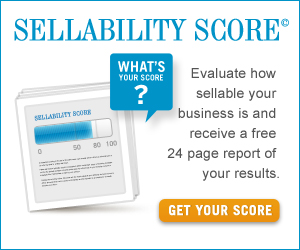Republished with permission from Built to Sell Inc.
Deck: Business valuation goes beyond simple mathematics, but to get some idea of what your business might be worth, consider the three methods below.

Photo by: Dylan Ng licensed under Creative Commons Attribution 2.0 Generic
Your business is likely your largest asset so it’s normal to want to know what it is worth. The problem is: business valuation is what one might call a “subjective science.”
The science part is what people go to school to learn: you can get an MBA or a degree in finance, or you can learn the theory behind business valuation and earn professional credentials as a business valuation professional.
The subjective part is that every buyer’s circumstances are different, and therefore two buyers could see the same set of company financials and offer vastly different amounts to buy the business.
This article provides the basic science and math behind the most common business valuation techniques, but keep in mind that there will always be outliers that fall well outside of these frameworks. These are strategic sales, where a business is valued based on what it is worth in the acquirer’s hands. Strategic acquisitions, however, represent the minority of acquisitions, so use the three methods below to triangulate around a realistic value for your company:
Assets-based
The most basic way to value a business is to consider the value of its hard assets minus its debts. Imagine a landscaping company with trucks and gardening equipment. These hard assets have value, which can be calculated by estimating the resale value of your equipment.
This valuation method often renders the lowest value for your company because it assumes your company does not have any “Good Will.” In accountant speak, “Good Will” has nothing to do with how much people like your company; Good Will is defined as the difference between your company’s market value (what someone is willing to pay for it) and the value of your net assets (assets minus liabilities).
Typically, companies have at least some Good Will, so in most cases you get a higher valuation by using one of the other two methods described below.
Discounted Cash Flow
In this method, the acquirer is estimating what your future stream of cash flow is worth to them today. They start by trying to figure out how much profit you expect to make in the next few years. The more stable and predictable your cash flows, the more years of future cash they will consider.
Once the buyer has an estimate of how much profit you’re likely to make in the foreseeable future, and what your business will be worth when they want to sell it in the future, the buyer will apply a “discount rate” that takes into consideration the time value of money. The discount rate is determined by the acquirer’s cost of capital and how risky they perceive your business to be.
Rather than getting hung up on the math behind the discounted cash flow valuation technique, it’s better to understand the drivers of your value when you use this method. They are: 1) how much profit your business is expected to make in the future; and 2) how reliable those estimates are.
Note that business valuation techniques are either/or and not a combination. For example, if you are using Discounted Cash Flow, the hard assets of the company are assumed to be integral to the generation of the profit the acquirer is buying and therefore not included in the calculation of your company’s value.
A money-losing bed and breakfast sitting on a $2 million piece of land is going to be better off using the Asset-based valuation method; whereas a professional services firm that expects to earn $500,000 in profit next year, but has little in the way of hard assets, will garner a higher valuation using the Discounted Cash Flow method or the Comparables technique described below.
Comparables
Another common valuation technique is to look at the value of comparable companies that have sold recently or for whom their value is public. For example, accounting firms typically trade at one times gross recurring fees. Home and office security companies trade at about two times monitoring revenue, and most security company owners know the Comparables technique because they are often getting approached to sell by private equity firms rolling up small security firms. Typically you can find out what companies in your industry are selling for by asking around at your annual industry conference.
The problem with using the Comparables methodology is that it often leads owners to make an apples-to-bananas comparison. For example, a small medical device manufacturer might think that, because GE is trading for 20 times last year’s earnings on the New York Stock Exchange, they too are worth 20 times last year’s profit. However, if one looks at the more than 13,000 businesses analyzed through the The Value Builder System, it’s clear that a small medical device manufacturer is likely to trade closer to five times pre-tax profit.
Small companies are deeply discounted when compared to their Fortune 500 counterparts, so comparing your company with a Fortune 500 giant will typically lead to disappointment.
Finally, the worst part about selling your business is that you don’t get to decide which methodology the acquirer chooses. An acquirer will do the math on what your business is worth to them behind closed doors. They may decide your business is strategic, in which case back up the Brinks truck because you’re about to get handsomely rewarded for your company. But in most cases, an acquirer will use one of the three techniques described here to come up with an offer to buy your business.
For more free information on Creating A Business Owner’s Dream Financial Plan, you can listen to a free, eight part series we did exclusively for business owners. The show is also available to subscribe to for free via iTunes.









